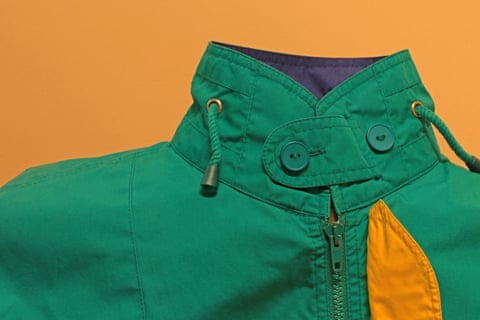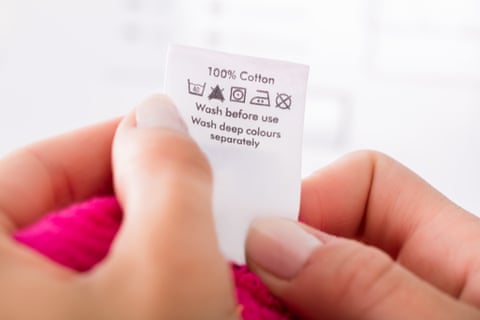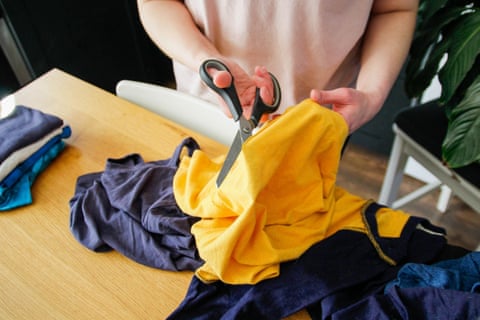The Guardian- While natural fibres are technically brown compostable materials, not everything that goes into a garment is written on the care label
Whether it’s the drawer you keep old tote bags in or a forgotten basket of stained T-shirts, piles of miscellaneous fabric you don’t know what to do with are an almost unavoidable part of modern life.
While there is an industry body working on an Australian textile recycling scheme, it is at least a few years away. In the meantime, textiles that are unsuitable for charitable donations remain a forgotten waste stream, making it tempting to look for alternative solutions. Imagine how satisfying it would be to treat old underwear like food waste by turning it into fertiliser via your home compost.
Technically, 100% cotton, linen and wool fabrics – those that have not been blended with any type of synthetic material (ie elastane, nylon or polyester) – are organic matter and should biodegrade in your home compost. However, since our clothes are made up of different components that aren’t always listed on the label, there are a few things to keep in mind before you throw your holey socks on the compost pile.
rst: are there any other uses for the item?
Before throwing any textile item in your compost, Courtney Holm, founder of Circular Sourcing, says it’s important to consider what else it might be useful for. Has it truly reached the end of its life or could it be repaired and donated, or repurposed?
She says: “Do you want to use it to wipe down benches, or for another application first?”
The basics of composting

Generally speaking, composting breaks organic matter down into a nutrient-rich substance. But not all organic matter is safe to compost.
The things that can go in your home compost bin fit into two broad categories: green and brown materials. Green materials include fruit and vegetable scraps, used tea and coffee grounds, crushed eggshells, garden clippings and weeds. Brown materials include paper, cardboard, dry leaves and sticks. Used textiles made from natural fibres count as brown material – with a few caveats.
If you’re just getting started with composting in general, it’s worth reading a more detailed guide to what can and can’t be composted.
Look for hidden synthetics

The first and biggest issue with home composting old clothes is that it is almost impossible to know exactly what materials a garment contains. Clothes can contain plastics and chemicals that are not on the care label, which stipulates the fabric composition, but does not account for things such as the thread used to sew a garment; or the makeup of zippers, buttons and elastic, which are almost always made from plastic.
Although elastics, zips and buttons can be removed before you put a garment in the compost, the more compromising factor is that the fabric might have been treated with chemical finishes and dyes that can be harmful in the compost.
“Whilst it seems intuitively right that all natural fibres can safely compost, wool can have chemical treatments which make it more durable, smooth and shrink resistant,” says Stephanie Devine, the founder and CEO of The Very Good Bra.
“Unfortunately, many cotton shirts and T-shirts are treated with formaldehyde and other chemicals to minimise creasing. Brands are not required to list the chemicals used in their labelling, so it is hard to know if a garment can be safely home composted.”
Are any clothes safe to compost?

Holm says garments made from certified organic cotton or linen that are untreated, unbleached and undyed, then sewn with organic threads, are the only textiles that can safely go in your compost bin. To be sure this is the case, she says: “You might have had to make the garment yourself.” You can also keep an eye out for certifications such as the Global Organic Textile Standard but even this is not a guarantee.
One thing that will make it easier to know which garments can and can’t go in the compost will be an Australian standard for compostable textiles, something Devine has been working on for a few years (the first of its kind globally).
Until the approved testing protocol for textiles composting is out and peer approved, and garments are certified to the new standard, there is no guarantee, she says.
How to compost organic textiles

Even if you are confident an item is plastic and chemical free, it is still best to cut up a garment before composting it. Holm says this is “so the compost doesn’t struggle with the huge mass”. Generally, the smaller the pieces, the quicker it will decompose.
If you’re worried about the threads used to sew a garment, you can also cut away any seams and dispose of them separately.
If you want to compost a pair of shorts or a shirt, you will also need to remove any hardware including zips, buttons, or hook and eyes. It’s also important to cut out any tags, elastics, binding and fusing.
If you’re confident your clothing can be composted, a worm farm might be the safest place to dispose of it as the worms act like a filter system, separating organic matter (which they eat) from plastics or things coated in chemicals.
Devine says worms tend to have high standards, “and whatever they choose not to eat, should not [have been] added to your compost”.
Although it might sound like a fun experiment to see if worms will eat the cotton in your underwear but not the elastane, it’s still best to heed the rules of composting: organic inputs only.
The Guardian




















